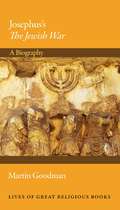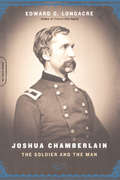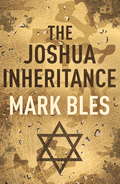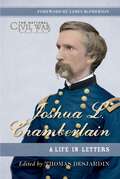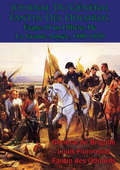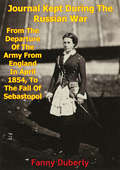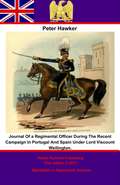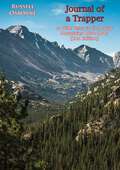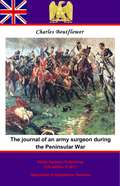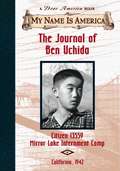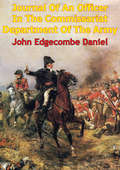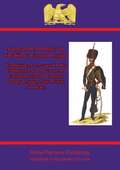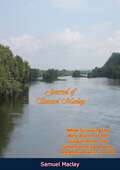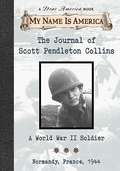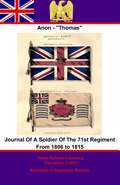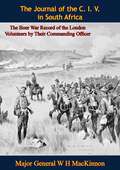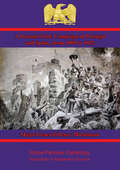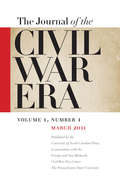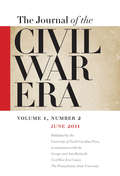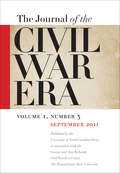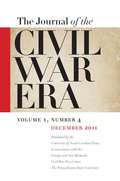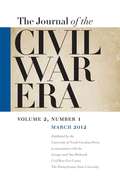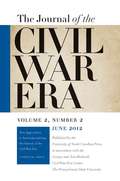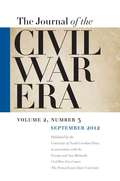- Table View
- List View
Josephus's The Jewish War: A Biography (Lives of Great Religious Books #45)
by Martin GoodmanAn essential introduction to Josephus’s momentous war narrativeThe Jewish War is Josephus's superbly evocative account of the Jewish revolt against Rome, which was crushed in 70 CE with the siege of Jerusalem and the destruction of the Temple. Martin Goodman describes the life of this book, from its composition in Greek for a Roman readership to the myriad ways it touched the lives of Jews and Christians over the span of two millennia.The scion of a priestly Jewish family, Josephus became a rebel general at the start of the war. Captured by the enemy general Vespasian, Josephus predicted correctly that Vespasian would be the future emperor of Rome and thus witnessed the final stages of the siege of Jerusalem from the safety of the Roman camp and wrote his history of these cataclysmic events from a comfortable exile in Rome. His history enjoyed enormous popularity among Christians, who saw it as a testimony to the world that gave rise to their faith and a record of the suffering of the Jews due to their rejection of Christ. Jews were hardly aware of the book until the Renaissance. In the nineteenth century, Josephus's history became an important source for recovering Jewish history, yet Jewish enthusiasm for his stories of heroism—such as the doomed defense of Masada—has been tempered by suspicion of a writer who betrayed his own people.Goodman provides a concise biography of one of the greatest war narratives ever written, explaining why Josephus's book continues to hold such fascination today.
Joshua Chamberlain: The Soldier and the Man
by Edward G. LongacreJoshua Chamberlain became the "hero of Gettysburg" when he and his regiment, the 20th Maine, bravely held Little Round Top against a determined Rebel assault. Chamberlain's reputation as a celebrated soldier continued to grow in the decades that followed the war. Yet, Joshua Chamberlain, the soldier, is only part of the story of his remarkable life. Edward G. Longacre's biography of Joshua Chamberlain is the first biography to examine the entire life and career of this complicated man. The author skillfully investigates and analyzes all aspects of his life and character-before and after the Civil War. And Longacre re-examines Chamberlain's extraordinary military career as a Union officer, drawing on independent-and occasionally contradictory-eyewitness accounts of his battlefield actions. Longacre's meticulous research also suggests that Chamberlain's own account of his military actions can no longer be taken entirely at face value.
The Joshua Inheritance
by Mark Whitcombe-PowerLondon 1945, VE Day. And for Edward Fairfax, a strange sense of anti-climax. Newly commissioned and eager to join the fighting, it seems the war has passed him by. A sense of mystery too. 'Operation Joshua', behind enemy lines, has been a disaster. His father is blamed and threatened with court martial, yet no-one will tell Edward the truth. A sense also of impending violence. A chance meeting with the beautiful Carole Romm will cast long shadowsinto his future. As the war in Europe ends, another begins in Palestine. The birth of the State of Israel is to be marked by bitterness and bloodshed. Edward will se action, not on the battlefields of Europe as he had dreamed, but in a harsh land where the enemy is unseen, and where Jewish and Arab extremists have only one thing in common: hatred of the British Empire.
Joshua L. Chamberlain
by Thomas DesjardinJoshua Lawrence Chamberlain has been a central character in two feature films (Gettysburg and Gods & Generals), a Pulitzer Prize-winning novel (The Killer Angels), and an inspiration for Ken Burns's production of the highly acclaimed PBS series The Civil War. Chamberlain won national fame at the Battle of Gettysburg for his key role in fending off the Confederates at Little Round Top on day two of the battle.This new volume brings to public light 300 never-before-seen letters from Chamberlain's personal correspondence, which comprises letters sent by or to Chamberlain from his college years in 1852 to his death in 1914. The first 100 letters shed light on Chamberlain's formative years and his courtship with Fannie Adams, which has been the source of much speculation by scholars. The final 200 letters reveal insights into Chamberlain the Union commander and the aftermath of the war. Chamberlain's image can be found on everything from historical art to sculpture, from t-shirts to clocks, from bobble-head dolls to snow globes. Despite all this attention, there is still a lot about Chamberlain that most people do not know. His life is a remarkable story of perseverance, tragedy, and triumph. From an insecure young man with a considerable stuttering problem who grew up in a small town in eastern Maine, Joshua Chamberlain rose to become a major general, recipient of the Medal of Honor, Governor of Maine, and President of Bowdoin College. His writings are among the most oft-quoted of all Civil War memoirs, and he has become a legendary, even mythical historical figure. Historian and acclaimed author, Thomas Desjardin, puts Chamberlain's words in contemporary and historical context and uses this extraordinary collection of letters to reveal--for the first time--the full and remarkable life of Joshua Chamberlain. Readers will find this unique portrait of Chamberlain to be entertaining, moving, and inspiring.
Josie Poe: Palouse, Washington, 1943 (American Diaries)
by Kathleen DueyPalouse, Washington, 1943. Please god, let us win this lousy war soon. World War II has changed life for everyone in the little farming town of Palouse, Washington. Josie Poe spends long nights afraid that bombs could begin to fall at any moment. Her days are consumed with trying to find ways to help the war effort. Like most American kids, she is growing a Victory Garden, wearing clothes that are two or three years old, and saving up money to buy war stamps and bonds. But the harder she works to help the war effort, the more Josie Poe is ashamed of her older brother. Tom hasn't enlisted in the armed services, even though all his good friends have. Everyone in town has a loved one fighting in Europe or the Pacific -- none of the other young men were cowardly about their duty. When a robbery seems to involve Tom, Josie has to find out the truth about her brother. What she learns -- and what she does -- will change her relationship with him forever.
Journal Du Général Fantin Des Odoards, Étapes D’un Officier De La Grande Armée, 1800-1830
by Général de Brigade Louis-Florimond Fantin des Odoards« Relation solide et précise des Campagnes d'Autriche en 1805, de Pologne en 1807, d'Espagne en 1808, de Russie en 1812, d'Allemagne en 1813, de France en 1814, de Belgique en 1815. » p 60 - Professeur Jean Tulard, Bibliographie Critique Sur Des Mémoires Sur Le Consulat Et L'Empire, Droz, Genève, 1971
Journal Kept During The Russian War: [Illustrated Edition]
by Frances Isabella Fanny" Duberly[Illustrated with over two hundred and sixty maps, photos and portraits, of the battles, individuals and places involved in the Crimean War]Frances Isabella ("Fanny") Duberly (27 September 1829 - January 1903) was the wife of Captain Henry Duberly, the 8th Royal Irish Hussars during the Crimean War, part of the British light cavalry that took part in the Charge of the Light Brigade. Duberley's journal of her time in the Crimea was published as Journal Kept During the Russian War. It not only includes eye-itness accounts, but is also a record of gossip and rumours circulating in the British Army.Duberly travelled with her husband to the Crimea in 1854 and stayed with him throughout his time there, despite the protests of commanders such as Lord Lucan. As the only officer's wife at the front, she was a centre of attention. She was told of planned attacks ahead of time, giving her the opportunity to be in a good position to witness them. Such was the case at the Battle of Balaclava, where her journey from camp to meet up with Henry and watch the battle took her quite close to the enemy. Though her husband survived the day (being away on staff duties), many of her friends did not: "Even my closed eyelids were filled with the ruddy glare of blood." Being so close to the front line in one of the first "modern" wars, Mrs Duberly differed from many of her compatriots back home in comprehending the reality of war. When her husband asked if she wanted to view the aftermath of the Battle of Inkerman, she told him she could not as "the thought of it made me shutter [sic] and turn sick."Duberly's adventures did not always sit well with society. She was pointedly snubbed at the Royal review of her husband's regiment after the war. The journal she published after the war had originally been intended to have a dedication to Queen Victoria, but this was refused. Nonetheless she was popular with the troops (who nicknamed her "Mrs. Jubilee") and many people in England.
Journal Of a Regimental Officer During The Recent Campaign In Portugal And Spain Under Lord Viscount Wellington.: With A Correct Plan Of The Battle Of
by Peter HawkerThis ebook is purpose built and is proof-read and re-type set from the original to provide an outstanding experience of reflowing text for an ebook reader. Captain Peter Hawker was a young officer, full of enthusiasm, cultured and with a eye of an artist in his when he started out his service in the Peninsula with the 14th Light Dragoons. Although memoirs of the Peninsula abound, most were written some years after the events described in them, his short reminiscence was written immediately after his return in 1810 and retains the freshness of his memory aided by notes of his journal that he entered at the time. Hawker entered into the fray in late 1808 and joined the Peninsular army just before Wellington took over command, the first part of his journal focuses on the sights and scenery in and around Lisbon as he takes the role of a tourist. He describes the beautiful yet un-healthy city, its churches and the destruction left by the occupying French before he moves with the army northward. He is none too pleased with the towns and villages that he enters filled as they are with vermin, fleas and lice. He and his squadron take part in the forcing passage of the Douro and engage in a successful but reckless charge against an entire brigade. Having ejected Soult and his French divisions in some disarray from Portugal, Hawker and his comrades pass into Spain, he masterfully describes the magnificent scenery, and although the villages are less mean and better kept the civilians are only happy whilst the British army advances. He gives a good account of the battle of Talavera in which he took a full part and was seriously wounded, and is not backward in apportioning blame to some of the Spanish soldiers who ran away without being seriously attacked. After the battle due to some serious miscommunication between Wellington and Cuesta, Hawker is left behind with the wounded and is forced to make his epic journey back to British lines with only his wits and his servant with him, his hip broken and a bullet lodged in his back. Text taken, whole and complete, from the 1810 edition, published by R Johnston, London. Original -137 pages Maps - 1 - Not Included due to its size - A3 Author - Peter Hawker - (1786-1853)
Journal of a Trapper or Nine Years in the Rocky Mountains 1834-1843: [2nd Edition]
by Russell OsborneJournal of a Trapper: Or Nine Years in the Rocky Mountains, 1834-1843 is a memoir written by Osborne Russell and first published in 1921. The book chronicles Russell's experiences as a trapper in the American West during the mid-19th century. Russell's journey began in 1834 when he left his home in Maine to join a fur trapping expedition in the Rocky Mountains. Over the next nine years, he would travel extensively throughout the region, trapping beaver and other animals for their valuable pelts. The book is divided into 29 chapters, each of which covers a different period of Russell's life as a trapper. He describes the harsh conditions that he and his fellow trappers faced, including extreme weather, dangerous wildlife, and hostile Native American tribes. Russell also provides detailed accounts of his hunting and trapping techniques, as well as his interactions with other trappers and traders. Throughout the book, Russell provides a vivid and detailed portrait of life in the American West during the mid-19th century. He offers insights into the culture and customs of the Native American tribes he encountered, as well as the attitudes and beliefs of the trappers and traders who inhabited the region. Journal of a Trapper: Or Nine Years in the Rocky Mountains, 1834-1843 is an important historical document that offers valuable insights into the early days of the American West. It is a fascinating read for anyone interested in the history of the region, as well as those interested in the life of a trapper during this period. Being A General Description Of The Country, Climate, Rivers, Lakes, Mountains, Etc., And A View Of The Life Led By A Hunter In Those Regions.-Print ed.
The Journal of an Army Surgeon during the Peninsular War (The\spellmount Library Of Military History)
by Charles BoutflowerThis ebook is purpose built and is proof-read and re-type set from the original to provide an outstanding experience of reflowing text for an ebook reader. A rarity amongst Peninsular accounts, are those that come from the medical services of the British army, Boutflower's journal was printed sixty years after his death but remains even now fresh and interesting. His duty was to patch, tend and mend the fighting men of the 40th Regiment of Foot, during the fierce fighting against the French. His journal principally focuses on the campaigns under the Duke of Wellington that stretched from 1809 to 1814, although his service had drawn him to South America and the West Indies beforehand. He was promoted to the staff of Sir Rowland "Daddy" Hill as surgeon in 1812, but not before he had seen and described the butchery of the battle of Albuera. Also present at the battle of Salamanca his narrative, in spite of some erratic spelling, contemporaneous, vital and gripping. A valuable and memorable work. Author - Charles Boutflower - (1782 - 1844) Text taken, whole and complete, from the edition published in 1911, Manchester, by Refuge Printing Dept Original - 196 pages.
The Journal of Ben Uchida: Citizen 13559 Mirror Lake Internment Camp, 1942 (My Name is America)
by Barry DenenbergFor almost 11 months in the internment camp, 12-year-old Ben Uchida keeps a journal and he writes, "It never seemed to matter before, but now my face was the face of the enemy".
Journal Of An Officer In The Commissariat Department Of The Army: Comprising A Narrative Of The Campaigns Under The Duke Of Wellington, In Portugal, Spain, France, And The Netherlands
by John Edgecombe Daniel"A reporter's eye on great historical events"Readers may be of the initial opinion that the view of an officer of the Commissariat Department would be necessarily less dynamic than that of a regimental officer. In fact, Daniel's position as a non-combatant has proved to be the exact opposite and of particular value to those interested in his subject matter by his comparative detachment from the narrow and confused view of the actual battle line. Daniel was able to overview the great events of which he was a participant and leave us essential reports that few were in a position to witness. Actually, Daniel was often close enough to the action as to have comrades killed next to him, so this is far from a view 'from behind the lines.' We follow Daniel on campaign with the 'Great Duke' throughout the Peninsula, over the Pyrenees and into Southern France. When the time comes to bring the Emperor to account at Waterloo, Daniel once again joined Wellington's Army in the field and he has provided another vital insight into the campaign of 1815 to enhance our knowledge of these pivotal events."-Print Edition
Journal Of An Officer In The King's German Legion
by AnonDuring the Napoleonic Wars, many elite units served their respective masters. However, few had such an enduring yet brief history as the King's German Legion. Recruited predominantly from Hanover, which had been invaded by the French in 1803, the men of the Legion would face many tough adventures all over Europe before returning to their homeland again.In this anonymously published memoir, the author recounts his adventures on land and sea, fighting fiercely against the Napoleonic domination of Europe from Denmark to Malta, from the mountains of Portugal to the plains of Spain. The author was present at the capture of Oporto and the battles of Talavera and Fuentes d'Oñoro, and his tales of adventure are described in pacy detail.Author -- AnonText taken, whole and complete, from the edition published in 1827, London, by Henry Colburn.Original Page Count - xxiv and 329 pages.
Journal of Samuel Maclay: While Surveying The West Branch Of The Susquehanna, The Sinnemahoning And The Allegheny Rivers, In 1790
by Samuel MaclayThe Journal of Samuel Maclay is one man’s account of a 1790 surveying expedition, commissioned by the Supreme Executive Council of Pennsylvania, to explore the newly purchased land in northwestern Pennsylvania, including the headwaters of the west branch of the Susquehanna, the Sinnemahoning, and the Allegheny Rivers. The journal, published in 1887 with ample historical annotations by John F. Meginness, provides a richly detailed record of Maclay’s travels in the “New Purchase” over five months, ending along the Juniata River in the Kishacoquillas Valley. It preserves both the physical landscape and the cultural milieu of the state between the American Revolution and the turn of the century, as seen through the eyes of an observant surveyor. Day-to-day details of dining and travel, as well as Maclay’s personal interjections, help establish the greater historical and cultural context of this pivotal era in Pennsylvania’s expansion.-Print ed.
The Journal of Scott Pendelton Collins: A World War II Soldier, Normandy, France, 1944 (My Name is America)
by Walter Dean MyersEach harrowing day of battle in France convinces 17-year-old Scott Pendleton Collins that he may not survive. In desperation, he records his thoughts, fears, and hopes in a journal he has carried since his first days as a soldier in Basic Training at Fort Dix.
Journal Of A Soldier Of The 71st Regiment From 1806 to 1815
by Pickle Partners Publishing Anon Thomas"This ebook is purpose built and is proof-read and re-type set from the original to provide an outstanding experience of reflowing text for an ebook reader. This work is the journal of an anonymous soldier from Edinburgh, known only as Thomas, having enlisted as a short term soldier for seven years in 1806. He was not motivated by any thought of gaining glory in the wars against France; his motive for enlisting was his lost honour and the shame of having wronged his parents following a failed attempt at a stage career. He was an educated man and wrote very well, but, haunted by the dishonour of his actions, he took the King's shilling from the first recruiting sergeant that was passing. Unknown to him this regiment was the 71st, later Highland Light Infantry, a regiment of great renown and élan that had and would be in the forefront of the fighting. Thomas saw his redemption in a journey through the purgatory of service as a private soldier in the British army. His travails would be hard and the privations many but bound by his word he sticks to his resolution. He was to campaign far and wide: from the expedition to Buenos Ayres, during which he was captured, to the despicable conditions of the retreat to Coruña, fever-ridden Walcheren, battles and skirmishes in the Peninsula including Roleia, Vimiero, Fuentes D'Oñoro, Vittoria, Bayonne and the Nivelle, and finally the battle of Waterloo. His discharge followed soon after and, despite being back in his homeland of Scotland, the penury of an ex-serviceman was his only reward. A vivid and uncompromising tale of hard fighting, privation and the realities of war. Text taken, whole and complete, Constable's Miscellany, Vol. XXVII, Memorials of the Late War Vol. I. published Constable & Co, Edinburgh 1828. Original -119 pages Author - Anon- (1790-????) There are no chapters, hence no TOC
The Journal of the C. I. V. in South Africa: The Boer War Record of the London Volunteers by Their Commanding Officer
by Major General W H MacKinnon“London men at war against the BoersThe turn of the 19th century to 20th was a time of popularity for the military volunteer movement in the British Empire. When the Anglo-Boer War broke out the City Imperial Volunteers quickly filled its ranks with the men of the City of London anxious to serve their country in South Africa. The venture was supported by the Lord Mayor and the popularity of London's effort had widespread appeal. All manner of men hurried to join the C. I. V's ranks and many of them were professionals from the city's law firms and financial institutions, artists, writers or gentlemen of private means. The author of The Riddle of the Sands, Erskine Childers was one of their number. This book is comprised of the journal entries of the officer commanding the regiment and it follows the C. I. V's wartime experiences from recruitment to its return home. The C. I. V was well regarded on campaign and earned the praise of peers and senior officers alike. This book delivers its information in the sober manner one might expect of its author in the circumstances, but is nevertheless essential source material about each part of the unit-the infantry, mounted infantry, cyclists, medical staff etc. Included as an appendix is a substantial honour role that will be of special interest to genealogists.”-Print ed.
A Journal of the Campaign in Portugal and Spain
by Major-General Henry MackinnonThis ebook is purpose built and is proof-read and re-type set from the original to provide an outstanding experience of reflowing text for an ebook reader. The body of Major-General Mackinnon now lies in St. Paul's Cathedral in London, next to his brother officer Major-General Robert Craufurd, both casualties of the assault on Cuidad Rodrigo during the Peninsular War. Mackinnon left behind his private journal filled with the details of the scenery, manners, customs and people of both Spain and Portugal as he found them during the Peninsular War, right up until his death. The journal was only intended for perusal by his closest family, but bears closer examination by those interested in the Peninsular War. Title - A Journal of the Campaign in Portugal and Spain Sub-Title - Containing Remarks on the Inhabitants, Customs, Trade and Cultivation, of those Countries, From the Year 1809 to 1812. Author -- Major-General Henry Mackinnon (????-1812) Text taken, whole and complete, from the edition published in 1907, London, by Longmans and Green. Original - iii and 102 pages.
The Journal of the Civil War Era, Volume 1, #1 (Spring #2011)
by William A. BlairThe University of North Carolina Press and the George and Ann Richards Civil War Era Center at the Pennsylvania State University are pleased to announce the launch of The Journal of the Civil War Era. William Blair, of the Pennsylvania State University, serves as founding editor.<P><P> The journal takes advantage of the flowering of research on the many issues raised by the sectional crisis, war, Reconstruction, and memory of the conflict, while bringing fresh understanding to the struggles that defined the period, and by extension, the course of American history in the nineteenth century.<P> The Journal of the Civil War Era aims to create a space where scholars across the many subfields that animate nineteenth-century history can enter into conversation with each other.<P> Table of Contents for this issue, Volume One, Number One:<P><P> Editor's Note<P> William Blair<P> Welcome to the New Journal<P><P> Articles<P><P> Edward L. Ayers and Scott Nesbit<P> Seeing Emancipation: Scale and Freedom in the American South<P><P> Melinda Lawson<P> Imagining Slavery: Representations of the Peculiar Institution on the Northern Stage, 1776-1860<P><P> LeeAnn Whites<P> Forty Shirts and a Wagonload of Wheat: Women, the Domestic Supply Line, and the Civil War on the Western Border<P><P> Review Essay<P> Douglas R. Egerton<P> Rethinking Atlantic Historiography in a Post-Colonial Era: The Civil War in a Global Perspective<P><P> Book Reviews<P> Books Received<P> Professional Notes<P> Aaron Sheehan-Dean<P> The Nineteenth-Century U.S. History Job Market, 2000-2009
The Journal of the Civil War Era, Volume 1, #2, (Summer #2011)
by William A. BlairThe University Of North Carolina Press And The George And Ann Richards Civil War Era Center At The Pennsylvania State University Are Pleased To Publish The Journal Of The Civil War Era. William Blair, Of The Pennsylvania State University, Serves As Founding Editor.<P><P> Table Of Contents For This Issue, Volume One, Number Two:<P> Volume 1, Number 2 June 2011<P> Table Of Contents<P> Articles<P><P> A. Kristen Foster<P> "We Are Men!": Frederick Douglass And The Fault Lines Of Gendered Citizenship<P><P> Kathryn S. Meier<P> "No Place For The Sick": Nature's War On Civil War Soldier: Mental And Physical Health In The 1862 Peninsula And Shenandoah Valley Campaigns<P><P> Brandi C. Brimmer<P> "Her Claim For Pension Is Lawful And Just": Representing Black Union Widows In Late-Nineteenth Century North Carolina<P><P> Review Essay<P> Frank Towers<P> Partisans, New History, And Modernization: The Historiography Of The Civil War's Causes, 1861-2011<P><P> Book Reviews<P> Books Received<P> Professional Notes<P> Daniel E. Sutherland<P> The Seven O'Clock Lecture<P><P> Notes On Contributors<P> The Journal Of The Civil War Era Takes Advantage Of The Flowering Of Research On The Many Issues Raised By The Sectional Crisis, War, Reconstruction, And Memory Of The Conflict, While Bringing Fresh Understanding To The Struggles That Defined The Period, And By Extension, The Course Of American History In The Nineteenth Century.
The Journal of the Civil War Era. Volume 1, #3 (Fall #2011)
by William A. BlairThe University Of North Carolina Press And The George And Ann Richards Civil War Era Center At The Pennsylvania State University Are Pleased To Publish The Journal Of The Civil War Era. William Blair, Of The Pennsylvania State University, Serves As Founding Editor.<P><P> Table Of Contents For This Issue:<P> Volume 1, Number 3: September 2011<P> Articles<P><P> Jon Grinspan<P> "Sorrowfully Amusing": The Popular Comedy Of The Civil War<P><P> Joan E. Cashin<P> Trophies Of War: Material Culture In The Civil War Era<P><P> Anne E. Marshall<P> The 1906 Uncle Tom's Cabin Law And The Politics Of Race And Memory In Early-Twentieth-Century Kentucky<P><P> Review Essay<P> Wayne Wei-Siang Hsieh<P> Total War And The American Civil War Reconsidered: The End Of An Outdated "Master Narrative" <P><P> Book Reviews<P> Books Received<P> Professional Notes<P> Barbara Franco<P> Planned Commemorations: Unexpected Consequences<P><P> Notes On Contributors<P> The Journal Of The Civil War Era Takes Advantage Of The Flowering Of Research On The Many Issues Raised By The Sectional Crisis, War, Reconstruction, And Memory Of The Conflict, While Bringing Fresh Understanding To The Struggles That Defined The Period, And By Extension, The Course Of American History In The Nineteenth Century.
Journal of the Civil War Era. Volume 1, #4 (Winter #2011)
by William A. BlairThe University Of North Carolina Press And The George And Ann Richards Civil War Era Center At The Pennsylvania State University Are Pleased To Publish The Journal Of The Civil War Era. William Blair, Of The Pennsylvania State University, Serves As Founding Editor.<P><P> Table Of Contents For This Issue:<P> Volume 1, Number 4: December 2011<P> Articles<P> Rachel A. Shelden<P> Messmates' Union: Friendship, Politics, And Living Arrangements In The Capital City, 1845–1861<P><P> Bruce Levine<P> "The Vital Element Of The Republican Party": Antislavery, Nativism, And Abraham Lincoln<P><P> James L. Huston<P> The Illinois Political Realignment Of 1844–1860: Revisiting The Analysis<P><P> Review Essay<P> Lyde Cullen Sizer<P> Mapping The Spaces Of Women's Civil War History<P> Book Reviews<P> Books Received<P> Professional Notes<P> Brian Kelly & John W. White<P> The After Slavery Website: A New Online Resource For Teaching U.S. Slave Emancipation<P><P> Notes On Contributors<P> The Journal Of The Civil War Era Takes Advantage Of The Flowering Of Research On The Many Issues Raised By The Sectional Crisis, War, Reconstruction, And Memory Of The Conflict, While Bringing Fresh Understanding To The Struggles That Defined The Period, And By Extension, The Course Of American History In The Nineteenth Century.
Journal of the Civil War Era, Volume 2, #1 (Spring #2012)
by William A. BlairThe Journal of the Civil War Era<P><P> Volume 2, Number 1<P> March 2012<P><P> TABLE OF CONTENTS<P><P> Forum<P><P> The Future of Civil War Era Studies<P> Stephen Berry, Michael T. Bernath, Seth Rockman, Barton A. Myers, Anne Marshall, Lisa M. Brady, Judith Giesberg, & Jim Downs<P> Articles<P> Jacqueline G. Campbell<P> "The Unmeaning Twaddle about Order 28″: Ben Butler and Confederate Women in Occupied New Orleans<P><P> David C. Williard<P> Executions, Justice, and Reconciliation in North Carolina's Western Piedmont, 1865-67<P><P> Matthew C. Hulbert<P> Constructing Guerrilla Memory: John Newman Edwards and Missouri's Irregular Lost Cause<P><P> Book Reviews<P> Books Received<P> Professional Notes<P> Kathi Kern & Linda Levstik<P> Teaching the New Departure: the United States vs. Susan B. Anthony<P><P> Notes on Contributors<P> The Journal of the Civil War Era takes advantage of the flowering of research on the many issues raised by the sectional crisis, war, Reconstruction, and memory of the conflict, while bringing fresh understanding to the struggles that defined the period, and by extension, the course of American history in the nineteenth century.
Journal of the Civil War Era, Volume 2, #2 (Summer #2012)
by William A. BlairThe Journal of the Civil War Era<P> Volume 2, Number 2<P> June 2012<P><P> TABLE OF CONTENTS<P><P> New Approaches to Internationalizing the History of the Civil War Era: A Special Issue<P><P> Editor's Note William Blair<P> Articles<P><P> W. Caleb Mcdaniel & Bethany L. Johnson<P> New Approaches to Internationalizing the History of the Civil War: An Introduction<P><P> Gale L. Kenny<P> Manliness and Manifest Racial Destiny: Jamaica and African American Emigration in the 1850s<P><P> Edward B. Rugemer<P> Slave Rebels and Abolitionists: The Black Atlantic and the Coming of the Civil War<P><P> Peter Kolchin<P> Comparative Perspectives on Emancipation in the U.S. South: Reconstruction, Radicalism, and Russia<P><P> Susan-Mary Grant<P> The Lost Boys: Citizen-Soldiers, Disabled Veterans, and Confederate Nationalism in the Age of People's War<P><P> Book Reviews<P> Books Received<P> Professional Notes<P><P> Mark W. Geiger<P> "Follow the Money"<P><P> Notes on Contributors<P><P> The Journal of the Civil War Era takes advantage of the flowering of research on the many issues raised by the sectional crisis, war, Reconstruction, and memory of the conflict, while bringing fresh understanding to the struggles that defined the period, and by extension, the course of American history in the nineteenth century.
Journal of the Civil War Era, Volume 2, #3 (Fall #2012)
by William A. BlairThe Journal of the Civil War Era<P> Volume 2, Number 3<P> September 2012<P> TABLE OF CONTENTS<P> Articles<P><P> Robert Fortenbaugh Memorial Lecture<P> Joan Waugh<P> "I Only Knew What Was in My Mind": Ulysses S. Grant and the Meaning of Appomattox<P><P> Patrick Kelly<P> The North American Crisis of the 1860s<P><P> Carole Emberton<P> "Only Murder Makes Men": Reconsidering the Black Military Experience<P><P> Caroline E. Janney<P> "I Yield to No Man an Iota of My Convictions": Chickamauga and Chattanooga National Military Park and the Limits of Reconciliation<P><P> Book Reviews<P> Books Received<P> Review Essay<P> David S. Reynolds<P> Reading the Sesquicentennial: New Directions in the Popular History of the Civil War<P><P> Notes on Contributors<P> The Journal of the Civil War Era takes advantage of the flowering of research on the many issues raised by the sectional crisis, war, Reconstruction, and memory of the conflict, while bringing fresh understanding to the struggles that defined the period, and by extension, the course of American history in the nineteenth century.
